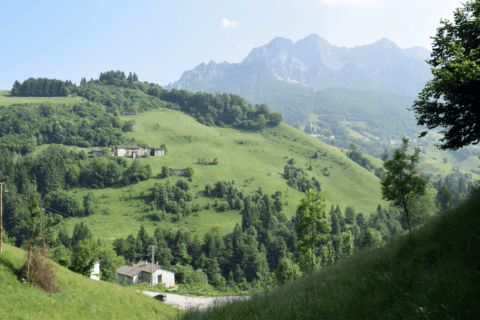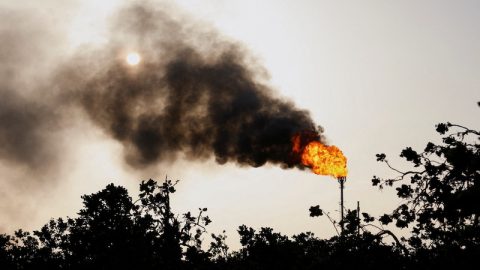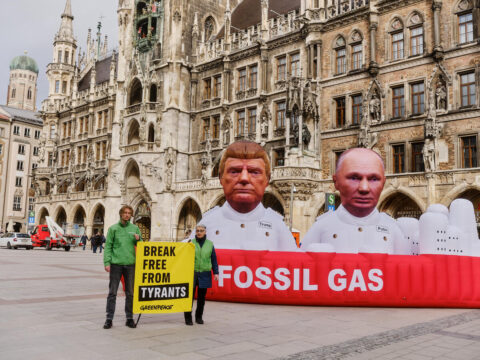Welcome to Carbon Brief’s DeBriefed.
An essential guide to the week’s key developments relating to climate change.
This week
Trump’s latest climate rollback
RULES REPEALED: The US Environmental Protection Agency (EPA) has begun dismantling Biden-era regulations limiting pollution from power plants, including carbon dioxide emissions, reported the Financial Times. Announcing the repeal, climate-sceptic EPA administrator Lee Zeldin labelled efforts to fight climate change a “cult”, according to the New York Times. Politico said that these actions are the “most important EPA regulatory actions of Donald Trump’s second term to date”.
WEBSITE SHUTDOWN: The Guardian reported that the National Oceanic and Atmospheric Administration (NOAA)’s Climate.gov website “will imminently no longer publish new content” after all production staff were fired. Former employees of the agency interviewed by the Guardian believe the cuts were “specifically aimed at restricting public-facing climate information”.
EVS TARGETED: The Los Angeles Times reported that Trump signed legislation on Thursday “seeking to rescind California’s ambitious auto emission standards, including a landmark rule that eventually would have barred sales of new gas-only cars in California by 2035”.
UK goes nuclear
NEW NUCLEAR: In her first spending review, UK chancellor Rachel Reeves announced £14.2bn for the Sizewell C new nuclear power plant in Suffolk, England – the first new state-backed nuclear power station for decades and the first ever under a Labour government, BBC News reported. The government also announced funding for three small nuclear reactors to be built by Rolls-Royce, said the Times. Carbon Brief has just published a chart showing the “rise, fall and rise” of UK nuclear.
MILIBAND REWARDED: The Times described energy secretary Ed Miliband as one of the “biggest winners” from the review. In spite of relentless negative reporting around him from right-leaning publications, his Department of Energy Security and Net Zero (DESNZ) received the largest relative increase in capital spending. Carbon Brief’s summary has more on all the key climate and energy takeaways from the spending review.
Around the world
- UN OCEAN SUMMIT: In France, a “surge in support” brought the number of countries ratifying the High Seas Treaty to just 10 short of the 60 needed for the agreement to become international law, according to Sky News.
- CALLING TRUMP: Brazil’s president Luiz Inácio Lula da Silva said he would “call” Trump to “persuade him” to attend COP30, according to Agence France-Presse. Meanwhile, the Associated Press reported that the country’s environmental agency has fast tracked oil and highway projects that threaten the Amazon.
- GERMAN FOSSIL SURGE: Due to “low” wind levels, electricity generation from renewables in Germany fell by 17% in the first quarter of this year, while generation from fossil-fuel sources increased significantly, according to the Frankfurter Allgemeine Zeitung.
- BATTERY BOOST: The power ministry in India announced 54bn rupees ($631m) in funding to build 30 gigawatt-hours of new battery energy storage systems to “ensure round-the-clock renewable energy capacities”, reported Money Control.
-19.3C
The temperature that one-in-10 London winters could reach in a scenario where a key Atlantic ocean current system “collapses” and global warming continues under “intermediate” emissions, according to new research covered by Carbon Brief.
Latest climate research
- A study in Science Advances found that damage to coral reefs due to climate change will “outpace” reef expansion. It said “severe declines” will take place within 40-80 years, while “large-scale coral reef expansion requires centuries”.
- Climatic Change published research which identified “displacement and violence, caregiving burdens, early marriages of girls, human trafficking and food insecurity” as the main “mental health” stressors exacerbated by climate change for women in lower and middle-income countries.
- The weakening of a major ocean current system has partially offset the drying of the southern Amazon rainforest, research published in Environmental Research has found, demonstrating that climate tipping elements have the potential to moderate each other.
(For more, see Carbon Brief’s in-depth daily summaries of the top climate news stories on Monday, Tuesday, Wednesday, Thursday and Friday.)
Captured
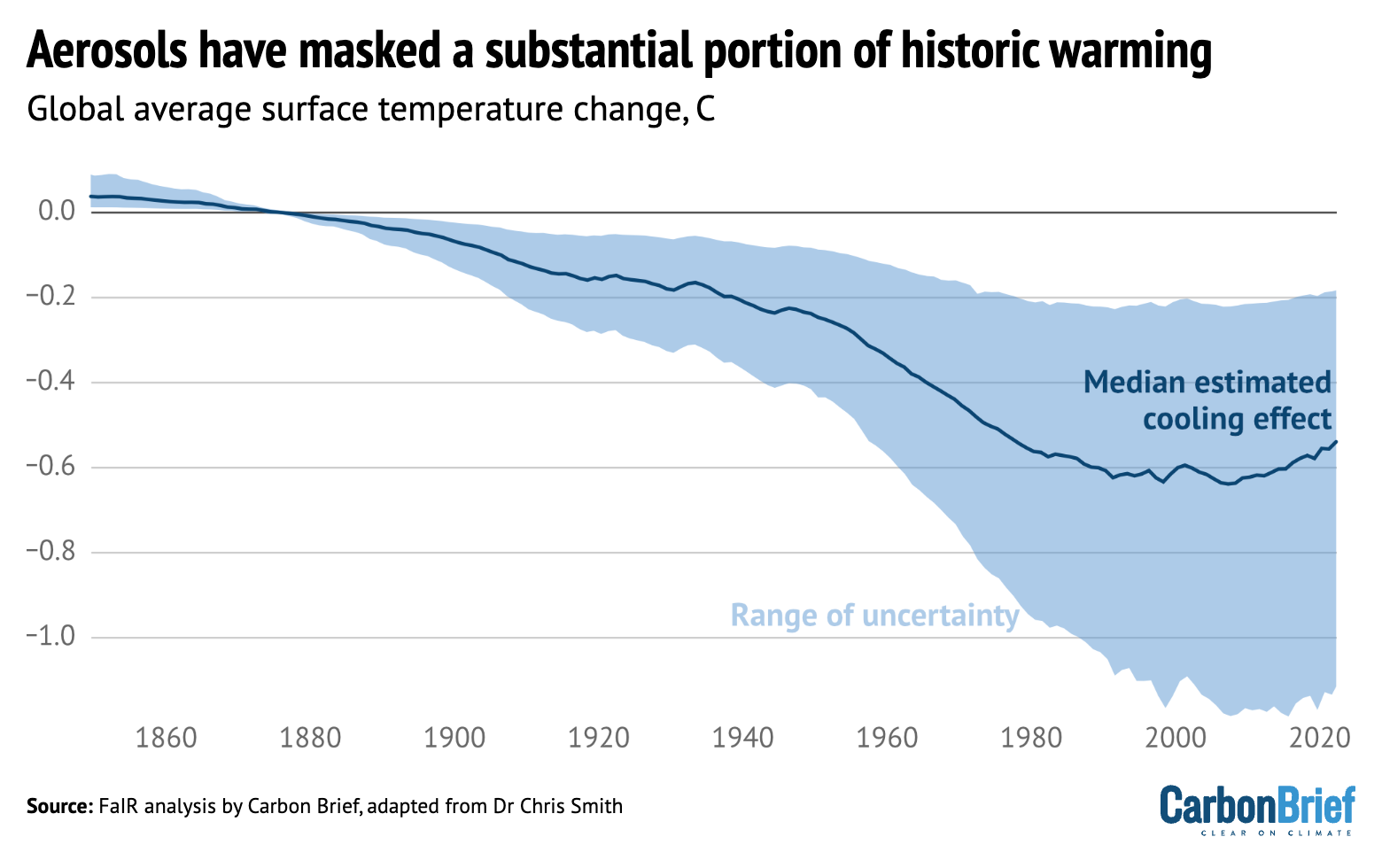
Aerosols – tiny light‑scattering particles produced mainly by burning fossil fuels – absorb or reflect incoming sunlight and influence the formation and brightness of clouds. In this way they have historically “acted as an invisible brake on global warming”. New Carbon Brief analysis by Dr Zeke Hausfather illustrated the extent to which a reduction in aerosol emissions in recent decades, while bringing widespread public health benefits through avoided deaths, has “unmasked” the warming caused by CO2 and other greenhouse gases. The chart above shows the estimated cooling effect of aerosols from the start of the industrial era until 2020.
Spotlight
How Carbon Brief turns complex research into visuals
This week, Carbon Brief’s interactive developer Tom Pearson explains how and why his team creates visuals from research papers.
Carbon Brief’s journalists will often write stories based on new scientific research or policy reports.
These documents will usually contain charts or graphics highlighting something interesting about the story. Sometimes, Carbon Brief’s visuals team will choose to recreate these graphics.
There are many reasons why we choose to spend time and effort doing this, but most often it can be boiled down to some combination of the following things.
Maintaining editorial and visual consistency
We want to, where possible, maintain editorial and visual consistency while matching our graphical and editorial style guides.
In doing this, we are trying to ease our audience’s reading experience. We hope that, by presenting a chart in a way that is consistent with Carbon Brief’s house style, readers will be able to concentrate on the story or the explanation we are trying to communicate and not the way that a chart might have been put together.
Highlighting relevant information
We want to highlight the part of a chart that is most relevant to the story.
Graphics in research papers, especially if they have been designed for a print context, often strive to illustrate many different points with a single figure.
We tend to use charts to answer a single question or provide evidence for a single point.
Paring charts back to their core “message”, removing extraneous elements and framing the chart with a clear editorial title helps with this, as the example below shows.
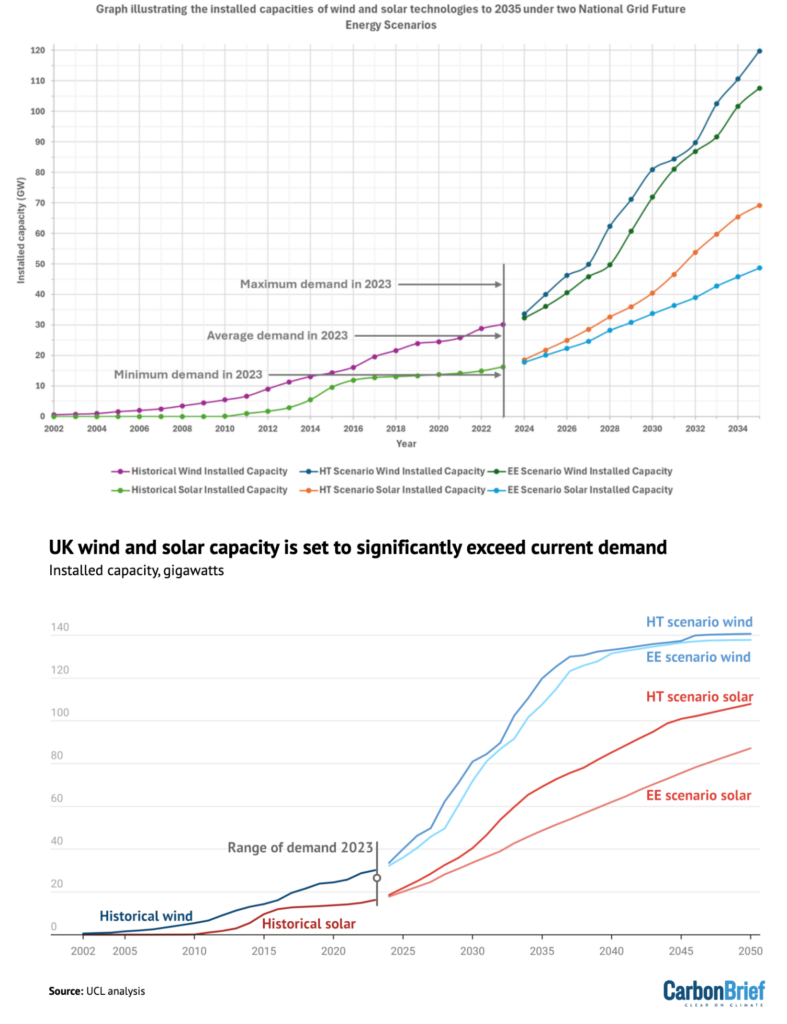
Ensuring audience understanding
We want to ensure our audience understands the “message” of the chart.
Graphics published in specialist publications, such as scientific journals, might have different expectations regarding a reader’s familiarity with the subject matter and the time they might be expected to spend reading an article.
If we can redraw a chart so that it meets the expectations of a more general audience, we will.
Supporting multiple contexts
We want our graphics to make sense in different contexts.
While we publish our graphics primarily in articles on our website, the nature of the internet means that we cannot guarantee that this is how people will encounter them.
Charts are often shared on social media or copy-pasted into presentations. We want to support these practices by including as much context relevant to understanding within the chart image as possible.
Below illustrates how adding a title and key information can make a chart easier to understand without supporting information.

When we do not recreate charts
When will we not redraw a chart? Most of the time! We are a small team and recreating data graphics requires time, effort, accessible data and often specialist software.
But, despite these constraints, when the conditions are right, the process of redrawing maps and charts allows us to communicate more clearly with our readers, transforming complex research into accessible visual stories.
Watch, read, listen
SPENDING $1BN ON CLIMATE: New Scientist interviewed Greg de Temmerman, former nuclear physicist turned chief science officer at Quadrature Climate Foundation, about the practicalities and ethics of philanthropic climate-science funding.
GENDER HURDLES: Research director Tracy Kajumba has written for Climate Home News about the barriers that women still face in attending and participating in COPs.
OCEAN HEATWAVES: The New York Times presented a richly illustrated look at how marine heatwaves are spreading across the globe and how they affect life in the oceans.
Coming up
- 16-26 June: Bonn climate talks, Bonn, Germany
- 16 June: 79th meeting of the World Meteorological Organization executive council, Geneva, Switzerland
- 17 June: International Energy Agency (IEA) Oil 2025 report launch
Pick of the jobs
- Inside Climate News, California environmental reporter | Salary: Unknown. Location: Southern California
- Natural Resources Wales, lead marine and energy policy advisor | Salary: £45,367-£50,877. Location: Wales
- Children’s Investment Fund Foundation, senior manager, climate | Salary: £82,000. Location: London/hybrid
- Green Party,social media and digital content officer | Salary: £33,211. Location: London/remote
DeBriefed is edited by Daisy Dunne. Please send any tips or feedback to debriefed@carbonbrief.org.
This is an online version of Carbon Brief’s weekly DeBriefed email newsletter. Subscribe for free here.
The post DeBriefed 13 June 2025: Trump’s ‘biggest’ climate rollback; UK goes nuclear; How Carbon Brief visualises research appeared first on Carbon Brief.
Climate Change
World leaders invited to see Pacific climate destruction before COP31
The leaders and climate ministers of governments around the world will be invited to meetings on the Pacific islands of Fiji, Palau and Tuvalu in the months leading up to the COP31 climate summit in November.
Under a deal struck between Pacific nations, Fiji will host the official annual pre-COP meeting, at which climate ministers and negotiators discuss contentious issues with the COP Presidency to help make the climate summit smoother.
This pre-COP, expected to be held in early October, will include a “special leaders’ component” hosted in neighbouring Tuvalu – 2.5-hour flight north – according to a statement issued by the Australian COP31 President of Negotiations Chris Bowen on LinkedIn on Thursday.
Bowen said this “will bring a global focus to the most pressing challenges facing our region and support investment in solutions which are fit for purpose for our region.” Australia will provide operational and logistical support for the event, he said.
Like many Pacific island nations, Tuvalu, which is home to around 10,000 people, is threatened by rising sea levels, as salt water and waves damage homes, water supplies, farms and infrastructure.
Dozens of heads of state and government usually attend COP summits, but only a handful take part in pre-COP meetings. COP31 will be held in the Turkish city of Antalya in November, after an unusual compromise deal struck between Australia and Türkiye.
In addition, Pacific country Palau will host a climate event as part of the annual Pacific Islands Forum (PIF) – which convenes 18 Pacific nations – in August.
Palau’s President Surangel Whipps Jr told the Australian Broadcasting Corporation (ABC) that this meeting would be a “launching board” to build momentum for COP31 and would draw new commitments from other countries to help Pacific nations cut emissions and adapt to climate change.
“At the PIF our priorities are going to be 100 per cent renewables, the ocean-climate nexus and … accelerating investments that build resilience from climate change,” he told ABC.
The post World leaders invited to see Pacific climate destruction before COP31 appeared first on Climate Home News.
World leaders invited to see Pacific climate destruction before COP31
Climate Change
There is hope for Venezuela’s future – and it isn’t based on oil
Alejandro Álvarez Iragorry is a Venezuelan ecologist and coordinator of Clima 21, an environmental NGO. Cat Rainsford is a transition minerals investigator for Global Witness and former Venezuela analyst for a Latin American think tank.
In 1975, former Venezuelan oil minister Juan Pablo Pérez Alfonzo gave a now infamous warning.
“Oil will bring us ruin,” he declared. “It is the devil’s excrement. We are drowning in the devil’s excrement.”
At the time, his words seemed excessively gloomy to many Venezuelans. The country was in a period of rapid modernisation, fuelled by its booming oil economy. Caracas was a thriving cultural hotspot. Everything seemed good. But history proved Pérez right.
Over the following decades, Venezuela’s oil dependence came to seem like a curse. After the 1980s oil price crash, political turmoil paved the way for the election of populist Hugo Chávez, who built a socialist state on oil money, only for falling prices and corruption to drive it into ruin.
By 2025, poverty and growing repression under Chávez’s successor Nicolás Maduro had forced nearly 8 million Venezuelans to leave the country.
Venezuela is now at a crossroads. Since the US abducted Maduro on January 3 and seized control of the country’s oil revenues in a nakedly imperial act, all attention has been on getting the country’s dilapidated oil infrastructure pumping again.
But Venezuelans deserve more than plunder and fighting over a planet-wrecking resource that has fostered chronic instability and dispossession. Right now, 80% of Venezuelans live below the poverty line. Venezuelans are desperate for jobs, income and change.
Real change, though, won’t come through more oil dependency or profiteering by foreign elites. Instead, it is renewable energy that offers a pathway forward, towards sovereignty, stability and peace.
Guri Dam and Venezuela’s hydropower decline
Venezuela boasts some of the strongest potential for renewable energy generation in the region. Two-thirds of the country’s own electricity comes from hydropower, mostly from the massive Guri Dam in the southern state of Bolívar. This is one of the largest dams in Latin America with a capacity of over 10 gigawatts, even providing power to parts of Colombia and Brazil.
Guri has become another symbol of Venezuela’s mismanagement. Lack of diversification caused over-reliance on Guri for domestic power, making the system vulnerable to droughts. Poor maintenance reduced Guri’s capacity and planned supporting projects such as the Tocoma Dam were bled dry by corruption. The country was left plagued by blackouts and increasingly turned to dirty thermoelectric plants and petrol generators for power.
Today, industry analysis suggests that Venezuela is producing at about 30% of its hydropower capacity. Rehabilitating this neglected infrastructure could re-establish clean power as the backbone of domestic industry, while the country’s abundant river system offers numerous opportunities for smaller, sustainable hydro projects that promote rural electrification.
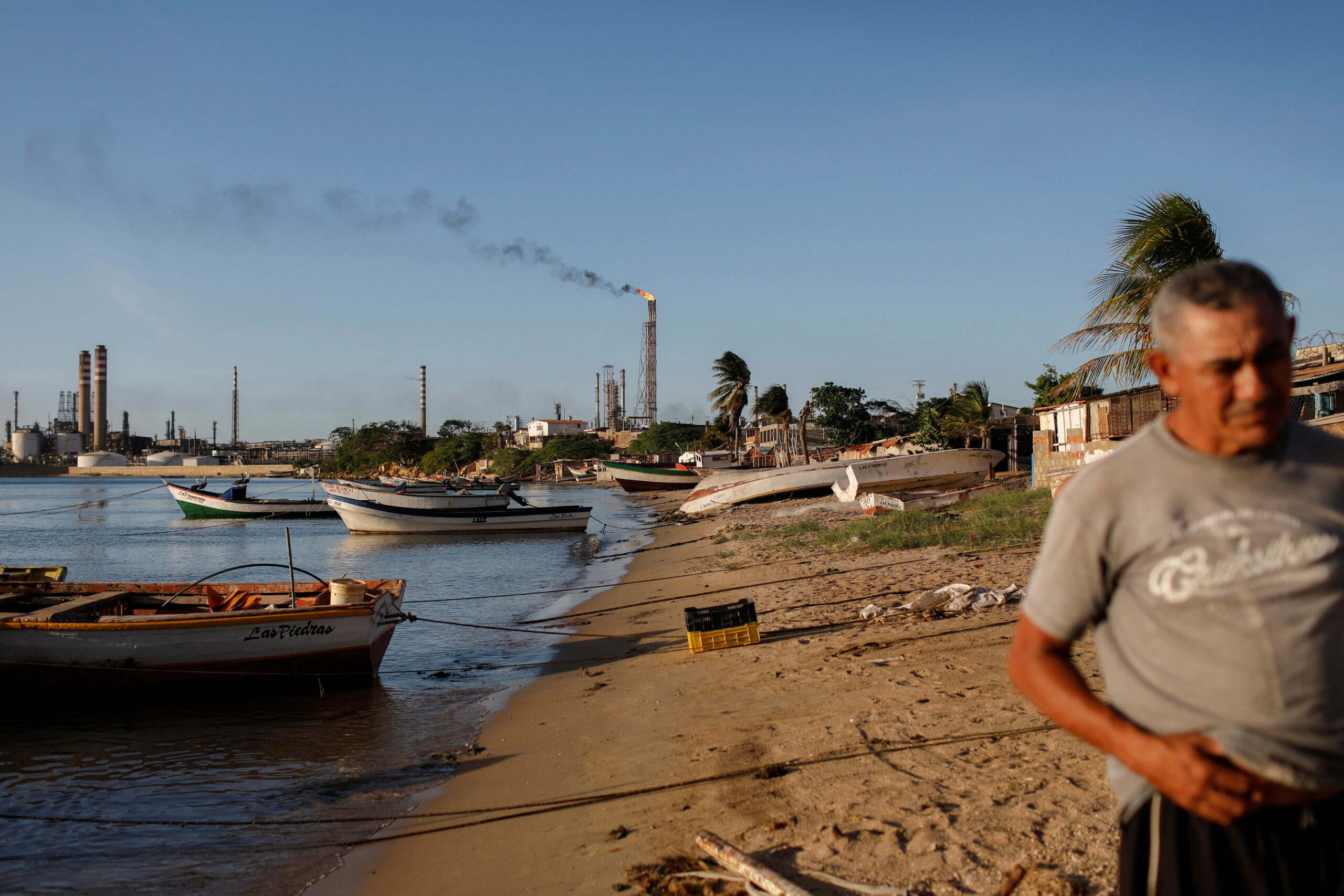

Venezuela also has huge, untapped promise in wind power that could provide vital diversification from hydropower. The coastal states of Zulia and Falcón boast wind speeds in the ideal range for electricity generation, with potential to add up to 12 gigawatts to the grid. Yet planned projects in both states have stalled, leaving abandoned turbines rusting in fields and millions of dollars unaccounted for.
Solar power is more neglected. One announced solar plant on the island of Los Roques remains non-functional a decade later, and a Chávez-era programme to supply solar panels to rural households ground to a halt when oil prices fell. Yet nearly a fifth of the country receives levels of solar radiation that rival leading regions such as northern Chile.
Developing Venezuela’s renewables potential would be a massive undertaking. Investment would be needed, local concerns around a just and equitable transition would have to be navigated and infrastructure development carefully managed.
Rebuilding Venezuela with a climate-driven energy transition
A shift in political vision would be needed to ensure that Venezuela’s renewable energy was not used to simply free up more oil for export, as in the past, but to power a diversified domestic economy free from oil-driven cycles of boom and bust.
Ultimately, these decisions must be taken by democratically elected leaders. But to date, no timeline for elections has been set, and Venezuela’s future hangs in the balance. Supporting the country to make this shift is in all of our interests.
What’s clear is that Venezuela’s energy future should not lie in oil. Fossil fuel majors have not leapt to commit the estimated $100 billion needed to revitalise the sector, with ExxonMobil declaring Venezuela “uninvestable”. The issues are not only political. Venezuela’s heavy, sour crude is expensive to refine, making it dubious whether many projects would reach break-even margins.
Behind it all looms the spectre of climate change. The world must urgently move away from fossil fuels. Beyond environmental concerns, it’s simply good economics.


Recent analysis by the International Renewable Energy Agency finds that 91% of new renewable energy projects are now cheaper than their fossil fuel alternatives. China, the world’s leading oil buyer, is among the most rapid adopters.
Tethering Venezuela’s future to an outdated commodity leaves the country in a lose-lose situation. Either oil demand drops and Venezuela is left with nothing. Or climate change runs rampant, devastating vulnerable communities with coastal loss, flooding, fires and heatwaves. Meanwhile, Venezuela remains locked in the same destructive economic swings that once led to dictatorship and mass emigration. There is another way.
Venezuelans rightfully demand a political transition, with their own chosen leaders. But to ensure this transition is lasting and stable, Venezuela needs more – it needs an energy transition.
The post There is hope for Venezuela’s future – and it isn’t based on oil appeared first on Climate Home News.
There is hope for Venezuela’s future – and it isn’t based on oil
Climate Change
UN’s new carbon market delivers first credits through Myanmar cookstove project
A cleaner cooking initiative in Myanmar is set to generate the first-ever batch of carbon credits under the new UN carbon market, more than a decade after the mechanism was first envisioned in the Paris Agreement.
The Article 6.4 Supervisory Body has approved the issuance of 60,000 credits, which correspond to tonnes of carbon dioxide equivalent reduced by distributing more efficient cookstoves that need less firewood and, therefore, ease pressure on carbon-storing forests, the project developers say. The approval of the credit issuance will become effective after a 28‑day appeal and grievance period.
The programme started in 2019 under the previous UN-run carbon offsetting scheme – the Clean Development Mechanism (CDM) – and is being implemented by a South Korean NGO with investment from private South Korean firms.
The credits are expected to be used primarily by major South Korean polluters to meet obligations under the country’s emissions trading system – a move that will also enable the government to count those units toward emissions reduction targets in its nationally determined contribution (NDC), the UN climate body told Climate Home News.
Myanmar will use the remaining credits to achieve in part the goals of its national climate plan.
Making ‘a big difference’
The approval of the credits issuance represents a major milestone for the UN carbon market established under article 6.4 of the Paris Agreement. By generating carbon credits that both governments and private firms can use, the mechanism aims to accelerate global climate action and channel additional finance to developing nations.
UNFCCC chief Simon Stiell said the approval of the first credits from a clean cooking project shows “how this mechanism can support solutions that make a big difference in people’s daily lives, as well as channeling finance to where it delivers real-life benefits on the ground”.
“Over two billion people globally are without access to clean cooking, which kills millions every year. Clean cooking protects health, saves forests, cuts emissions and helps empower women and girls, who are typically hardest hit by household air pollution,” he added in a statement.
Concerns over clean cookstove credits
Carbon markets are seen as an important channel to raise money to help low-income communities in developing countries switch to less polluting cooking methods. Proceeds from the sale of carbon credits made up 35% of the revenue generated by for-profit clean cooking companies in 2023, according to a report by the Clean Cooking Initiative.
But many cookstove offsetting projects have faced significant criticism from researchers and campaigners who argue that climate benefits are often exaggerated and weak monitoring can undermine claims of real emission reductions. Their main criticism is that the rules allow project developers to overestimate the impact of fuel collection on deforestation, while relying on surveys to track stove usage that are prone to bias and can further inflate reported impacts.
As Louisiana bets big on ‘blue ammonia’, communities brace for air pollution
The project in Myanmar follows a contested methodology developed under the Kyoto Protocol that was rejected last year by The Integrity Council for the Voluntary Carbon Market (ICVCM), a watchdog that issues quality labels to carbon credit types, because it is “insufficiently rigorous”.
An analysis conducted last year by Brussels-based NGO Carbon Market Watch claimed that the project would generate 26 times more credits than it should, when comparing its calculations with values from peer-reviewed scientific literature.
‘Conservative’ values cut credit volume
But, after transitioning from the CDM to the new mechanism, the project applied updated values and “more conservative” assumptions to calculate emission reductions, according to the UNFCCC, which added that this resulted in 40% fewer credits being issued than would have been the case in the CDM.
“The result is consistent with environmental integrity requirements and ensures that each credited tonne genuinely represents a tonne reduced and contributes to the goals of the Paris Agreement,” said Mkhuthazi Steleki, the South African chair of article 6.4 Supervisory Body, which oversees the mechanism.
Over 1,500 projects originally developed under the CDM requested the transition to the new mechanism, including controversial schemes subsidising fossil gas-powered plants in China and India. But, so far, the transfer of only 165 of all those projects has been approved by their respective host nations, which have until the end of June to make a final decision.
The UN climate body said this means that “a wide variety of real-world climate projects are already in line to follow” in sectors such as renewable energy, waste management and agriculture. But the transfer of old programmes from the CDM has long been contested with critics arguing that weak and discredited rules allow projects to overestimate emission reductions.
Genuinely new projects unrelated to the CDM are expected to start operating under the Paris Agreement mechanism once the Supervisory Body approves the first custom-made methodologies.
The post UN’s new carbon market delivers first credits through Myanmar cookstove project appeared first on Climate Home News.
UN’s new carbon market delivers first credits through Myanmar cookstove project
-
Greenhouse Gases7 months ago
Guest post: Why China is still building new coal – and when it might stop
-
Climate Change7 months ago
Guest post: Why China is still building new coal – and when it might stop
-

 Greenhouse Gases2 years ago
Greenhouse Gases2 years ago嘉宾来稿:满足中国增长的用电需求 光伏加储能“比新建煤电更实惠”
-
Climate Change2 years ago
Bill Discounting Climate Change in Florida’s Energy Policy Awaits DeSantis’ Approval
-
Climate Change2 years ago
Spanish-language misinformation on renewable energy spreads online, report shows
-

 Climate Change2 years ago
Climate Change2 years ago嘉宾来稿:满足中国增长的用电需求 光伏加储能“比新建煤电更实惠”
-
Climate Change Videos2 years ago
The toxic gas flares fuelling Nigeria’s climate change – BBC News
-

 Carbon Footprint2 years ago
Carbon Footprint2 years agoUS SEC’s Climate Disclosure Rules Spur Renewed Interest in Carbon Credits




